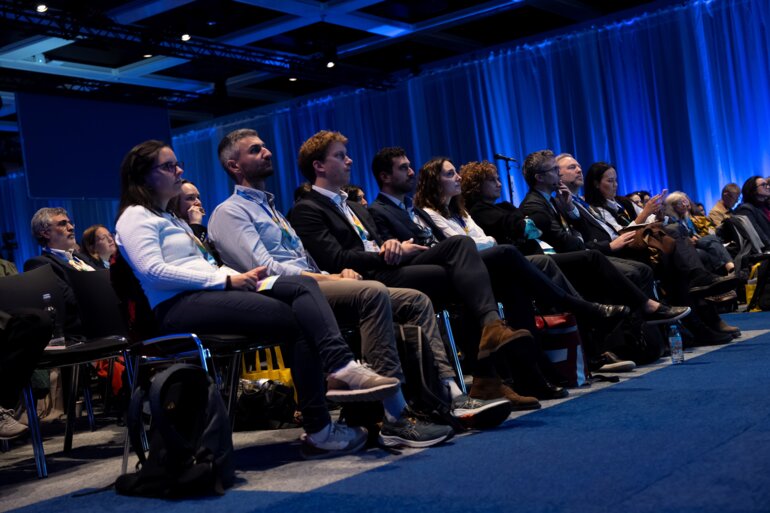From cell-based therapies to soluble T-cell engagers and T-cell co-stimulation, early findings show novel promising strategies, although more data are needed
Findings from studies presented at the ESMO Immuno-Oncology Congress 2021 highlight ongoing efforts to improve outcomes in patients with solid tumours using novel immunotherapy strategies.
“Given the success of chimeric antigen receptor (CAR)-T-cell therapy in haematological cancers, these treatments gained much attention within the research community. However, progress has been much slower with solid tumours due to a number of factors including the lack of unique target antigens, tumour heterogeneity and the immunosuppressive microenvironment,” says Dr Marco Donia from the National Center for Cancer Immune Therapy, Copenhagen University Hospital Herlev, Denmark.
One way to enhance cell-based therapies is through more effective engineering of functional cells. A presentation at a Mini Oral Session at the ESMO Immuno-Oncology Congress 2021 describes preliminary data with SQZ-PBMC-HPV, an autologous cell-based vaccine targeting HPV16 viral oncoprotein E6 and E7, which uses the Cell Squeeze® delivery platform (Abstract 48MO). In the dose-escalation part of the phase I/II trial, 18 patients with advanced or metastatic HPV16+ solid tumours who were positive for HLA-A*02 received SQZ-PBMC-HPV (NCT04084951). One unconfirmed partial response was observed in the 5 response-evaluable patients in the highest dose cohort, and this patient showed a significant increase in CD8 T-cell infiltrates.
”Microfluidic squeezing is an interesting approach for cytosolic delivery of antigens into peripheral blood mononuclear cells since it may result in less impact on cell state and function compared with electroporation or chemical-based methods,” says Donia commenting on the technique. “Efficacy data are too preliminary, but any positive signs in such a heavily pre-treated population warrant further investigation. Combining SQZ-PBMC-HPV with checkpoint inhibition is planned for the next part of the trial and it will be interesting to see if there is synergism between the two types of immunotherapy. However, only treating HLA-A*02 positive patients, as with many antigen-specific therapies, may limit the applicability of SQZ-PBMC-HPV.”
A similar approach involves autologous dendritic cells (DCs). An e-Poster describes preliminary immunological findings from a phase II trial in which autologous DCs were loaded with autologous tumour lysate and injected intradermally near lymph nodes in the adjuvant setting in 10 patients with resected stage III–IV melanoma (Abstract 49P). Increased T-cell proliferation was noted upon DC costimulation and increased IFNɣ-specific spot-forming cells for at least one tumour antigen was observed in 4 patients. Donia says, “The antigen-presenting cell approach has the potential to induce more natural activation of T-cell responses compared with other strategies; however, a previous phase III trial of an adjuvant DC vaccine in patients with stage IIIB and IIIC melanoma showed no benefit in terms of 2-year relapse-free survival (Ann Oncol. 2020;31(Suppl_4):S672–S710).” As with SQZ-PBMC-HPV, Donia thinks the real benefits of these approaches in advanced solid tumours should be better evaluated when these vaccines are used in combination with other immunotherapies.
[FIGURE]
Looking at a new, different strategy to immunotherapy, Donia thinks soluble T-cell redirector molecules may at least overcome some of the logistical limitations of cell-based therapies (Ann Oncol. 2021; doi: 10.1016/j.annonc.2021.09.020. online ahead of print), such as ease of manufacture, supply and regulatory issues connected with using advanced therapy medicinal products. ImmTACs (immune-mobilising monoclonal T-cell receptors against cancer) are bispecific soluble molecules that combine a T-cell receptor (TCR)-targeting system with an anti-CD3 effector (Cancer Treat Rev. 2019;77:35–43). Unlike antibody-based therapies that are limited to extracellular antigens, ImmTACs can redirect T cells to target a vast array of cancer-specific intracellular antigens.
Translational data are important to gain insights into the exact mechanism of action, to help guide the next steps of development and to provide insight into potential biomarkers of response.
An e-Poster describes preliminary clinical data on IMC-C103C, a TCR bispecific protein against the cancer-testis antigen, MAGE-A4, which is expressed in many solid malignancies but not normal tissues (J Clin Oncol. 2020;38(Suppl):TPS3165) (Abstract 91P). In this first-in-human phase I trial (NCT03973333), IMC-C103C demonstrated pharmacodynamic activity consistent with T-cell activation at higher doses in 42 patients positive for HLA-A*02:01 with MAGE-A4-positive advanced cancers. Donia explains, “This approach has already been validated – we recently saw overall survival benefits in metastatic uveal melanoma with the bispecific protein tebentafusp (N Engl J Med. 2021;385:1196–1206). Early data with IMC-C103C are encouraging, in light of the non-dramatic toxicity observed, and warrant further investigation. However, again, a limitation is the HLA-restriction, which means that IMC-C103C, like tebentafusp and SQZ-PBMC-HPV, is highly specific only towards one HLA subtype. In addition, weekly infusions may not be feasible in all treatment settings.”
Using a novel delivery approach, maveropepimut-S has been designed to generate specific T-cell responses against tumour cells by incorporating survivin targets within a lipid nanoparticle formulation. Previously, it has been shown that maveropepimut-S treatment resulted in infiltration of survivin-specific T cells in the tumour microenvironment of patients with advanced ovarian cancer (J Clin Oncol. 2020;38(Suppl):6-6), and new data presented at the ESMO Immuno-Oncology Congress 2021 suggest that B cells are also activated in these patients (Abstract 51P). Given all the unknowns with new immunotherapies, Donia says translational data are “important to gain insights into the exact mechanism of action, to help guide the next steps of development and to provide insight into potential biomarkers of response.”
Regarding immuno-oncology targets, an e-Poster describes the characterisation of monoclonal antibodies against the human T-cell costimulatory receptor, CD27 (Abstract 133P). Pre-clinical testing demonstrated robust T-cell activation and cytokine secretion and 5 out of the 147 anti-CD27 antibodies are being carried forward for further development. Donia explains, ”In the early search for immunotherapies, antibodies were developed for CD28, a costimulatory molecule similar to CD27. However, the unexpected cytokine storm seen with an anti-CD28 antibody in a phase I trial (N Engl J Med. 2006;355:1018–1028) and the success of checkpoint inhibitors shifted the focus away from agents that directly stimulate T cells. The e-Poster suggests CD27 may be a novel therapeutic target, and the antibodies showed promising in vitro activity, but given the major toxicities occurring with anti-CD28 antibodies, caution is needed in human trials.” He concludes, “Because of the limited therapeutic benefits of checkpoint inhibitors in some patients, there are renewed efforts to develop antibodies against costimulatory molecules such as CD27, and also CD137 and OX40, and we await these developments with interest.”
Park J-C, et al. SQZ-PBMC-HPV-101: Preliminary results of a first-in-human, dose-escalation study of a cell-based vaccine in HLA A*02+ patients with recurrent, locally advanced, or metastatic HPV16+ solid tumors. ESMO Immuno-Oncology Congress 2021, Abstract 48MO
Mini Oral Session, 09.12.2021, h. 11:00 – 12:40, Room C
Ridolfi L, et al. A Phase II randomized trial with adjuvant autologous tumor lysate-pulsed dendritic cells (DC) in resected stage III-IV melanoma patients: preliminary immunological results. ESMO Immuno-Oncology Congress 2021, Abstract 49P
Davar D, et al. Phase 1 dose escalation of IMC-C103C, a CD3×MAGE-A4 T cell receptor (TCR) bispecific protein. ESMO Immuno-Oncology Congress 2021, Abstract 91P
Dorigo O, et al. Translational analyses of the DeCidE phase 2 clinical study in advanced ovarian cancer patients reveal a substantial role for B cells in the clinical benefit derived from maveropepimut-S (MVP-S) treatment. ESMO Immuno-Oncology Congress 2021, Abstract 51P
Guillaudeux T, et al. Novel fully human agonist antibodies against the T-cell costimulatory receptor CD27 shape adaptive anti-tumor immunity. ESMO Immuno-Oncology Congress 2021, Abstract 133P






